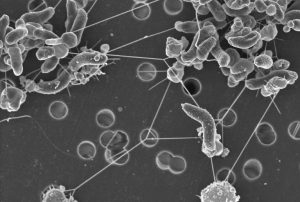 Managing tradeoffs through gene regulation is believed to confer resilience to a microbial community in a fluctuating resource environment. Microbial generalists are metabolically versatile and able to cope with periodically or randomly fluctuating natural environments by up- or down-regulating genes to optimize resource utilization. However, it is generally assumed and not demonstrated whether or how regulatory mutations foster adaptive evolution to new environments. We investigate these questions in an environmentally significant context in which a sulfate-reducing generalist (Desulfovibrio vulgaris) has to manage the tradeoff between retaining metabolic independence (active capacity for sulfate respiration) and becoming metabolically specialized to a mutualistic association with a methanogen (Methanococcus maripaludis) when sulfate is not available. During long term experimental evolution and even in anaerobic digesters, a microbial culture or community experiences frequent, iterative changes and bottlenecks due to growth and successive transfers to new media (Chen et al, 2008; Demirel & Yenigün, 2002). We have demonstrated how disrupted regulation stabilizes frequent transitions of a generalist between metabolic independence and mutualism, fostering its longer term adaptive evolution in a fluctuating resource environment. Further, we provide evidence that the population collapse occurs due to loss of relational resilience, i.e., progressive drift from the environmentally-relevant physiological state (Fuhrman et al, 2015). Our studies in this project led to manuscripts Turkarslan et al., 2017.
Managing tradeoffs through gene regulation is believed to confer resilience to a microbial community in a fluctuating resource environment. Microbial generalists are metabolically versatile and able to cope with periodically or randomly fluctuating natural environments by up- or down-regulating genes to optimize resource utilization. However, it is generally assumed and not demonstrated whether or how regulatory mutations foster adaptive evolution to new environments. We investigate these questions in an environmentally significant context in which a sulfate-reducing generalist (Desulfovibrio vulgaris) has to manage the tradeoff between retaining metabolic independence (active capacity for sulfate respiration) and becoming metabolically specialized to a mutualistic association with a methanogen (Methanococcus maripaludis) when sulfate is not available. During long term experimental evolution and even in anaerobic digesters, a microbial culture or community experiences frequent, iterative changes and bottlenecks due to growth and successive transfers to new media (Chen et al, 2008; Demirel & Yenigün, 2002). We have demonstrated how disrupted regulation stabilizes frequent transitions of a generalist between metabolic independence and mutualism, fostering its longer term adaptive evolution in a fluctuating resource environment. Further, we provide evidence that the population collapse occurs due to loss of relational resilience, i.e., progressive drift from the environmentally-relevant physiological state (Fuhrman et al, 2015). Our studies in this project led to manuscripts Turkarslan et al., 2017.
